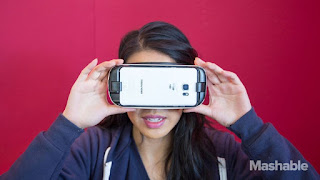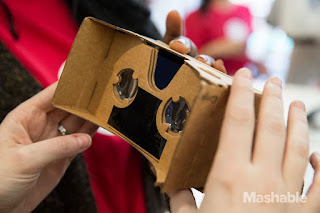If you've tried virtual reality, whether or not it blew your mind probably depends on how you experienced it: whether it was with a high-end headset like theOculus Rift or one that used a smartphone like the Samsung Gear VR.
While today's flagship phones can provide a decent VR experience, they have shortcomings. Latency is an issue since the immersive nature of VR taxes the processor. Mobile VR also doesn't support much interactivity — meaning you can't touch or pick things up in the virtual environment, which is crucial for games. And even though manufacturers are squeezing more resolution into displays than ever before, when the screen is just an inch from your face, you can see the pixels.
In short, handset makers need to take today's flagship phone designs to the next level if they're going to deliver a real sense of "presence" — the hallmark of a good VR experience. Today, the company all those manufacturers depend on is giving them a blueprint to do just that.
The mobile industry is banking on VR to be a hit.
ARM Holdings, which designs the architecture for nearly all the world's mobile processors, is announcing a new type of chip, the Cortex-A73, which is designed with VR in mind. Alongside the A73, ARM is also unveiling a new graphics engine, called the Mali-G71. While ARM improves its chip tech every year, this year VR was very much top of mind.
"We generally try to think about use cases to come," Simon Segars, CEO of ARM, told Mashable during an advance briefing about the announcement. "When you think about the trends in virtual reality, augmented reality… latency is a huge deal when using a VR headset. You move your head, and the screen's got to move. Any lag in that, and it can be pretty unpleasant. Refresh rate is key, you don't want any flicker at all."
Both designs improve performance while saving energy. The Cortex-A73 performs 30% better than the previous A72, and it's 30% more energy efficient. But VR phones may benefit even more from the new Mali, which boots performance by 50% and is 20% more energy efficient. The power gains are crucial, since great mobile VR won't make much difference if your battery drains too fast to enjoy the experience.
ARM, of course, doesn't actually build processors, so this is just the first step toward building the next generation of phones. Now the chipmakers of the world can take ARM's design and begin creating designs for next year's flagship smartphones (think the Galaxy S8 and iPhone 7S). ARM says it's already begun working with Samsung, MediaTek and HiSilicon. Qualcomm, which makes the chips for most of the world's top smartphones, wasn't named, but ARM said there were "others."
Will VR save mobile?
ARM's new designs will make it easier for handset makers to build VR-ready smartphones, like ones that meet or excel Google's new Daydream spec for Android. Soon, phones with turbocharged processors, 4K screens and very low latency will be common. The question then becomes: Will consumers want them?
The field of VR is commanding a lot of attention and even greater funding, but it's very early days, and it remains to be seen whether it will ever become a mainstream technology. Segars believes it will, although he concedes VR is still waiting for the content that will take it to the next level.
"Do I think use cases are going to emerge that will resonate with people — yeah, I do," he says. "Is it there yet? No, it isn't. There isn't much VR content. Gaming will be a great driver for this. It creates a different, immersive experience, but the killer application maybe isn't quite there."
The mobile industry is banking on VR to be a hit. Android and iOS are both reaching platform maturity, and many markets worldwide are approaching full smartphone saturation. Even the mighty Apple — whose growth in mobile once seemed unstoppable — saw iPhone sales decline last quarter. Handset makers need to give consumers a reason to upgrade their phones, and many people think VR is it.
As far as ARM is concerned, Segars isn't worried. Even absent the VR phenomenon, he says, the world would want better smartphones.
"Smart mobile computers are evolving all the time," he says. "People want lighter devices, you want battery life that's longer all the time. You don't just want peak performance, you want sustained performance — it's not about the peak, it's about how long that lasts."
"People want lighter devices, you want battery life that's longer all the time."
In any case, even if mobile begins to weaken, ARM has a future. Just under half (~45%) of all ARM-based chips in the world are mobile chips, Segars says. A big reason for that is everything needs a chip now — from your TV to your car to your Amazon Echo. The Internet of Things has been good to ARM.
"If we get the technology right in mobile, the same technology can be used in lots of other applications," Segars says. "The [infotainment] systems in cars use exactly the same collection of technology, for example. We've really seen this expand."
Still, you have to think ARM is hoping for VR as much as Google and Facebook. If virtual reality (and its cousin, augmented reality) becomes the new way to experience media, it'll mean the demand for better chips — and new and improved ARM designs — will continue for years to come. Then the only issue will be finding ways to keep Moore's Law going once transistors can't shrink any further. At least with good VR, ARM's engineers will have a great way of distracting them from thinking about that problem.
Have something to add to this story? Share it in the comments.



No comments:
Post a Comment